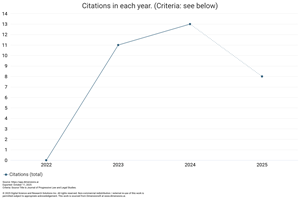Optimizing the Organization of Statistical Activities through the Revision of Law No. 16 of 1997 Concerning Statistics
DOI:
https://doi.org/10.59653/jplls.v1i03.333Keywords:
Optimization, Basic Statistics, ReformAbstract
This research to find out and study how implementation of basic statistics carried out by the Central Statistics Agency based on Law Number 16 of 1997 concerning Statistics (Statistics Law); what are the obstacles in optimizing the implementation of basic statistics and how to overcome the obstacles in implementing basic statistics optimally through reform of the Statistics Law. This research is normative legal research with a legal political and legal sociology approach, which examines the Statistics Law as positive law in the administration of basic statistics and formulates legal substance that should be implemented in the future. The data source is secondary data consisting of primary legal materials and secondary legal materials. Data collection methods use library studies and interviews. Primary legal materials and secondary legal materials are analyzed using legal analysis methods. The deductive thinking process is used to draw conclusions. The theoretical basis used as an analytical tool in reviewing research results and discussions is the theory of legal effectiveness and public policy theory. The results of this research indicate that the implementation of basic statistical activities by BPS based on the Statistics Law is not running optimally because there are obstacles, such as: low public awareness of the importance and usefulness of statistics, the application of criminal sanctions for respondents that are not effective and statistical data in ministries/ Partial government institutions. These obstacles are fundamental and cannot be overcome casuistically but must be done with comprehensive and revolutionary efforts, so efforts to overcome them are by reforming the Statistics Law so that the implementation of basic statistical activities by BPS can run optimally. From this explanation it can be concluded that in order to obtain legal certainty for both BPS officers and respondents, an article is needed that guarantees legal certainty so that if respondents refuse, they can be given sanctions which of course must be regulated in the Law on Statistics. We as authors propose and suggest that the Government can immediately update the Statistics Law and correct the weaknesses we have mentioned above.
Downloads
References
Bambang Waluyo, 2002. Legal Research in Practice, Jakarta: Sinar Grafika.
C.S.T Kansil, 2009. Dictionary of Legal Terms, Jakarta: Gramedia Pustaka, page 385.
Darji Darmodiharjo in Hyronimus Rhiti, 2011. Philosophy of Law; complete edition (From classic to postmodern), Jakarta: Sinar Grafika, p. 159.
H. Zainuddin Ali, 2009. Legal Writing Methods, Jakarta: Sinar Grafika.
J Supranto MA, Statistics, Theory and Application, Erlangga, Ed. 11. 1998. Page 2.
Jausairi Hasbullah, Op. Cit. Page 22
Jousari Hasbullah, Competent with Statistics, Accurate in Reading the Reality of the World. Nuansa Cendekia. Ed. 1.
Lysa Angrayni, 2014. Introduction to Legal Science, Pekanbaru: Suska Press.
Miharja, M., 2019. Treasury of Legal Thought in Indonesia. Qiara Media.
Miles, M.B and Huberman A.M., 1984, Qualitative Data Analysis. Translated by Tjetjep
Moleong, Lexy J., 2007. Qualitative Research Methodology, Bandung: PT Remaja Rosdakarya Offset.
Muhammad Erwin, 2012. Philosophy of Law, Jakarta: Raja Grafindo, p. 123.
Muhammad Syukri Albani Nasution, 2017. Law in Philosophical Approach, 2nd ed., Jakarta: Kencana, pp. 217-218.
Presidential Regulation No. 39 of 2019 concerning One Data Indonesia
Peter Mahmud Marzuki, 2005. Legal Research, Jakarta: Kencana Prenada Media Group.
Richard A. Johnson and Dean W. Wichern, Business Statistics, Decision Making With Data. Page 2.
Rohendi Rohidi. 1992. Jakarta: Universitas Indonesia Publisher.
Soerjono Soekanto, 2004. Factors Affecting Law Enforcement, Fifth Edition, Jakarta: Raja Grafindo Persada.
Soerjono Soekanto, 2005. Introduction to Legal Research, Jakarta: Universitas Indonesia Press.
Sudikno Mertokusumo, 2005. Understanding Law: An Introduction, Yogyakarta: Liberty.
Sugiyono, 2010. Research Methods in Education: Quantitative, Qualitative, and R&D Approaches, Bandung: Alfabeta.
Sukendra, I Komang, and I Kadek Surya Atmaja, 2020. Research Instruments, Pontianak: Mahameru Press.
Titik Triwulan Tutik, 2006. Introduction to Legal Science, Jakarta: Prestasi Pustaka. Constitution of 1945 Law Number 16 of 1997 concerning Statistics
W.J.S. Poerwadarminta, 2006. General Dictionary of Indonesian, Third Edition, Jakarta: Balai Pustaka, p. 847.
Downloads
Published
How to Cite
Issue
Section
License
Copyright (c) 2023 Ramdhanul Yuliarto, Moh. Zeinudin, Made Warka

This work is licensed under a Creative Commons Attribution-ShareAlike 4.0 International License.
Authors who publish with this journal agree to the following terms:
- Authors retain copyright and grant the journal right of first publication with the work simultaneously licensed under a Creative Commons Attribution-ShareAlike that allows others to share the work with an acknowledgement of the work's authorship and initial publication in this journal.
- Authors are able to enter into separate, additional contractual arrangements for the non-exclusive distribution of the journal's published version of the work (e.g., post it to an institutional repository or publish it in a book), with an acknowledgement of its initial publication in this journal.
- Authors are permitted and encouraged to post their work online (e.g., in institutional repositories or on their website) prior to and during the submission process, as it can lead to productive exchanges, as well as earlier and greater citation of published work (See The Effect of Open Access).
























